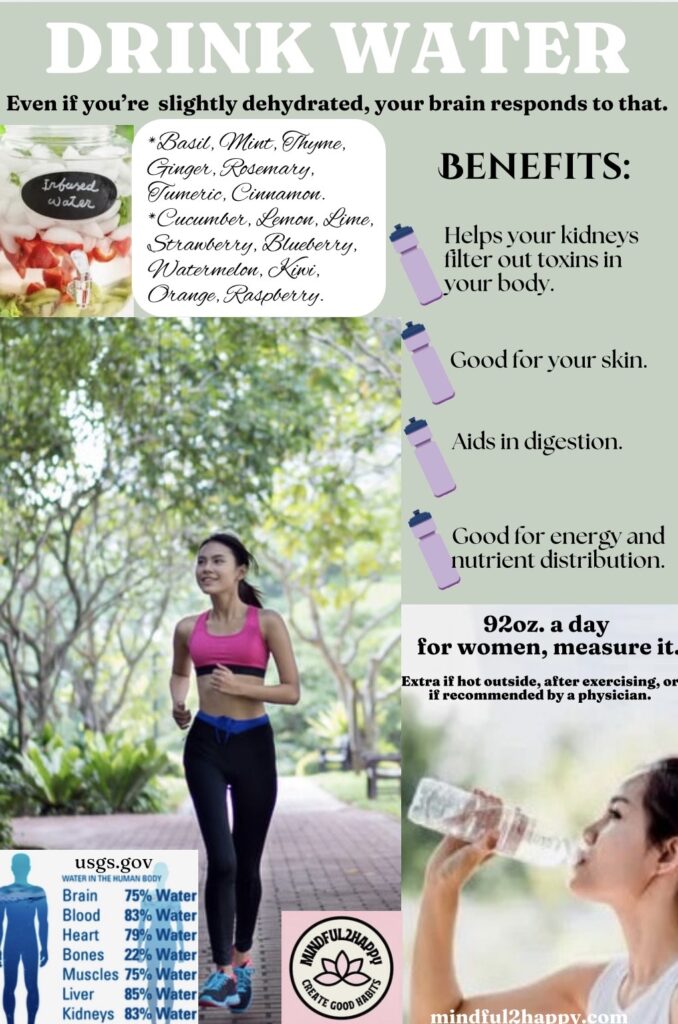*Why hydration?
Drinking enough water daily is important for the mind and body. Your body content consists of mostly water therefore it’s important to replenish it throughout the day to aid in proper body function. The following are percentages of water content in the body: 75% in the brain, 83% in the blood, 79% in the heart, 22% in the bones, 75% in the muscles, 85% in the liver, and 83% in the kidneys. That’s a lot of water!
*What are the benefits of drinking enough water?
Water can be thought of as the fuel of your body. You need it to get you to where you need to go. Water is lost when the body performs functions such as breathing, removal of waste, and metabolism. It helps your kidneys filter out toxins in your body, it keeps your skin from drying out, it aids in digestion, it’s needed for energy and nutrient distribution, it prevents overheating by regulating body temperature, it lubricates joints and tissues, among other things. Drinking enough water will help your body stay healthy and properly function.
*Water and the brain.
Even if you’re slightly dehydrated your brain responds to that, if your brain is thirsty it will struggle with focus and memory. The brain is an organ that creates your mind, your brain makes you who you are. Research shows that the physical health of the brain can be improved. To have a healthy mind, you need a healthy brain. Keeping the brain healthy can prevent diseases such as Alzheimer’s and Dementia.
*Tips to ensure that you are getting enough water:
Add natural ingredients to your water such as lemon, lime, berries, watermelon, oranges (orange peels) and/or kiwi. Add cucumber and/or herbs/spices such as basil, thyme, mint, rosemary, turmeric, cinnamon, and/or ginger for flavoring. Find your happy recipe. Make a healthy smoothie with these ingredients. Eat fruits and vegetables high in water such as lettuce or other leafy greens, cucumbers, bell peppers, summer squash, celery, berries, and melons.
*Additional Tips:
Drink water from a safe water source. City water departments should provide an annual water sample report to you directly or online. If you have a well, I recommend that you have your water sampled annually to verify the safety of the water you are drinking. If you buy bottled water, some companies provide water sample reports on their website. I would recommend staying away from the companies that don’t provide proof of safety. Also, note that there may be concerns with bottled water packaged in plastic such as bottles that may have been in hot delivery trucks or warehouses . Drinking water from home is recommended if from a safe source, it saves money as opposed to buying water from a store, it reduces waste from plastic bottles, and it’s easily accessible.
*So how much water should we drink a day?
Well, that depends on where you’re getting your information. I’ve always been told to drink at least 8 cups of water a day, but according to The Academy of Nutrition and Dietetics, women should be consuming at least 9 cups (72 oz.) of water a day and 12.5 cups (100 oz.) for men. But according to The National Academies of Sciences, Engineering, and Medicine women should consume about 11.5 cups (92 oz.) of fluids per day and 15.5 cups (125 oz.) for men. So, choose the guidance that suits you. Be sure to account for water in both food and beverages. It’s also important to know that the amount of water a person needs a day can vary depending on a number of factors such as climate (hot temperatures causes you to sweat and lose fluids more quickly, while higher altitudes can lead to dehydration), exercise (physical activity causes you to lose fluids through sweat), your size, metabolism, diet, and your overall health. So, be sure to increase your water intake based on certain circumstances.
*How much water should kids drink a day?
Per The National Academy of Medicine children ages 4-8 should drink 40 ounces or 5 cups a day. Kids ages 9-13 years old should drink 7-8 cups (56-64 oz.) a day. These numbers should be used as a general guide only. Always refer to your physician for specific guidance to meet your needs.
*Does the color of urine tell you if you’re dehydrated?
Yes, the amount and color of urine can provide a rough estimate of adequate hydration. Generally, the color of urine darkens the more concentrated it is (meaning that it contains less water). However, foods, medications, and vitamin supplements can also change urine color. Smaller volumes of urine may indicate dehydration, especially if also darker in color. Other indicators of dehydration, which may appear with as little as a 2% water deficit include: fatigue, mood changes (irritability or depression), and confusion. Negative impacts to the body include: constipation, UTI’s, kidney stones, and gallstones.
*How can I make sure I drink enough water?
Use a fun thermos for kids and figure out how many times a day it would need replenished for your child to drink enough water. Add their favorite natural fruits if needed for good flavor to encourage hydration. My son loves lemon slices in his water, while my daughter loves ice. Reward them for meeting their daily goal. Do the same for yourself and remember that consistency is key, once you have the good habit down, drinking enough will become natural. When buying a thermos or tumbler, I recommend stainless steel vs plastic and choose one that is easy to clean at the bottle and the lid and one that is easy to take places. I use a 40 oz. tumbler everyday, so I fill up twice and account for my cups of morning and evening tea.
*Drinks I like recommend:
- Green tea/black tea with honey and lemon (hot or cold).
- Chamomile tea at night.
- Fruit infused water (lemon or orange peels with crush mint).
- Smoothies with honey, fruit, spinach, & almond milk.
*What drinks to avoid?
Research has shown that alcohol can shrink your brain. It can suppress anti-diuretic hormone, a fluid-regulating hormone that signals the kidneys to reduce urination and reabsorb water back into the body. Without it, the body flushes out water more easily. Enjoying more than a couple of drinks within a short time can increase the risk of dehydration, especially if taken on an empty stomach. To help prevent this, take alcohol with food and sips of water or simply skip the alcohol. As for caffeine, which has been long thought to have a diuretic effect potentially leading to dehydration, research does not fully support this. An amount more than 180 mg of caffeine daily (about two cups of brewed coffee) may increase urination but may not necessarily lead to dehydration. Therefore, caffeinated beverages including coffee and tea can contribute to total daily water intake, although I recommend sticking to water.

